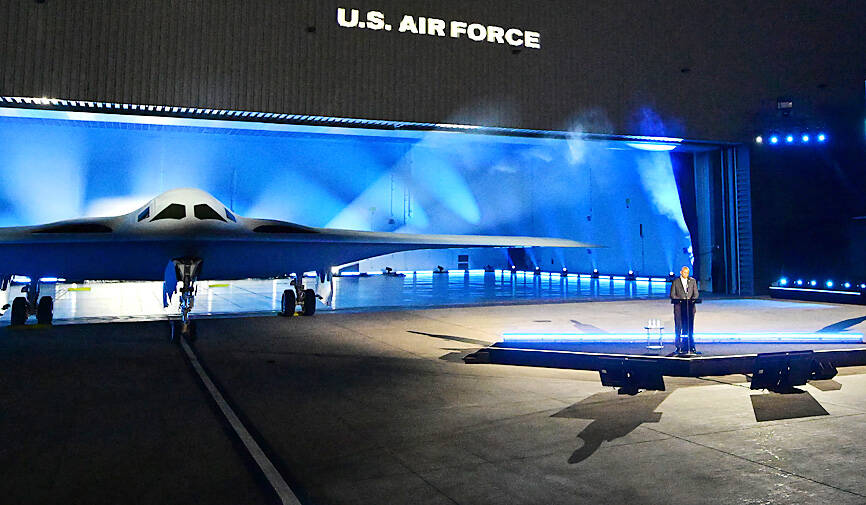The US is at a pivotal point with China and needs military strength to ensure that US values, not Beijing’s, set global norms in the 21st century, US Secretary of Defense Lloyd Austin said on Saturday.
Austin’s speech at the Reagan National Defense Forum capped a week in which the Pentagon was squarely focused on China’s rise and what that might mean for the US’ position in the world.
On Monday last week, it released an annual China security report that warned Beijing would likely have 1,500 nuclear warheads by 2035, with no clarity on how China would seek to use them.

Photo: AFP
On Friday in a dramatic nighttime rollout, Austin was on hand as the public got its first glimpse of the military’s newest, highly classified nuclear stealth bomber, the B-21 Raider, which is being designed to best the quickly growing cyber, space and nuclear capabilities of Beijing.
China “is the only country with both the will and, increasingly, the power to reshape its region and the international order to suit its authoritarian preferences,” Austin said on Saturday. “So let me be clear: We will not let that happen.”
The Pentagon is also concerned about Russia and remains committed to arming Ukraine, while avoiding escalating that conflict into a US war with Moscow, he said at the forum, held at the Ronald Reagan Presidential Library.
“We will not be dragged into Putin’s war,” Austin said.
“These next few years will set the terms of our competition with the People’s Republic of China. They will shape the future of security in Europe,” Austin said. “And they will determine whether our children and grandchildren inherit an open world of rules and rights — or whether they face emboldened autocrats who seek to dominate by force and fear.”
Still, between the two nuclear power threats, China remains the greater risk, Austin said.
To meet that rise, “we’re aligning our budget as never before to the China challenge,” Austin said. “In our imperfect world, deterrence does come through strength.”
The bomber is part of a major nuclear triad overhaul underway that the US Congressional Budget Office (CBO) has estimated would cost US$1.2 trillion through 2046.
It includes the Raider serving as the backbone of the future air leg of the triad, but it also requires modernizing the nation’s silo-launched nuclear intercontinental ballistic missiles and its nuclear submarine fleet.
The US Department of Defense has the largest discretionary budget of all the federal agencies, and it might receive up to US$847 billion in next year’s budget if the US Congress passes the current funding bill before this legislative session ends.
Defense advocates say it is still not enough to modernize and keep up with China because much of that spending goes to military personnel.

A Ministry of Foreign Affairs official yesterday said that a delegation that visited China for an APEC meeting did not receive any kind of treatment that downgraded Taiwan’s sovereignty. Department of International Organizations Director-General Jonathan Sun (孫儉元) said that he and a group of ministry officials visited Shenzhen, China, to attend the APEC Informal Senior Officials’ Meeting last month. The trip went “smoothly and safely” for all Taiwanese delegates, as the Chinese side arranged the trip in accordance with long-standing practices, Sun said at the ministry’s weekly briefing. The Taiwanese group did not encounter any political suppression, he said. Sun made the remarks when

The Taiwanese passport ranked 33rd in a global listing of passports by convenience this month, rising three places from last month’s ranking, but matching its position in January last year. The Henley Passport Index, an international ranking of passports by the number of designations its holder can travel to without a visa, showed that the Taiwan passport enables holders to travel to 139 countries and territories without a visa. Singapore’s passport was ranked the most powerful with visa-free access to 192 destinations out of 227, according to the index published on Tuesday by UK-based migration investment consultancy firm Henley and Partners. Japan’s and

BROAD AGREEMENT: The two are nearing a trade deal to reduce Taiwan’s tariff to 15% and a commitment for TSMC to build five more fabs, a ‘New York Times’ report said Taiwan and the US have reached a broad consensus on a trade deal, the Executive Yuan’s Office of Trade Negotiations said yesterday, after a report said that Washington is set to reduce Taiwan’s tariff rate to 15 percent. The New York Times on Monday reported that the two nations are nearing a trade deal to reduce Taiwan’s tariff rate to 15 percent and commit Taiwan Semiconductor Manufacturing Co (TSMC, 台積電) to building at least five more facilities in the US. “The agreement, which has been under negotiation for months, is being legally scrubbed and could be announced this month,” the paper said,

MIXED SOURCING: While Taiwan is expanding domestic production, it also sources munitions overseas, as some, like M855 rounds, are cheaper than locally made ones Taiwan and the US plan to jointly produce 155mm artillery shells, as the munition is in high demand due to the Ukraine-Russia war and should be useful in Taiwan’s self-defense, Armaments Bureau Director-General Lieutenant General Lin Wen-hsiang (林文祥) told lawmakers in Taipei yesterday. Lin was responding to questions about Taiwan’s partnership with allies in producing munitions at a meeting of the legislature’s Foreign Affairs and National Defense Committee. Given the intense demand for 155mm artillery shells in Ukraine’s defense against the Russian invasion, and in light of Taiwan’s own defensive needs, Taipei and Washington plan to jointly produce 155mm shells, said Lin,